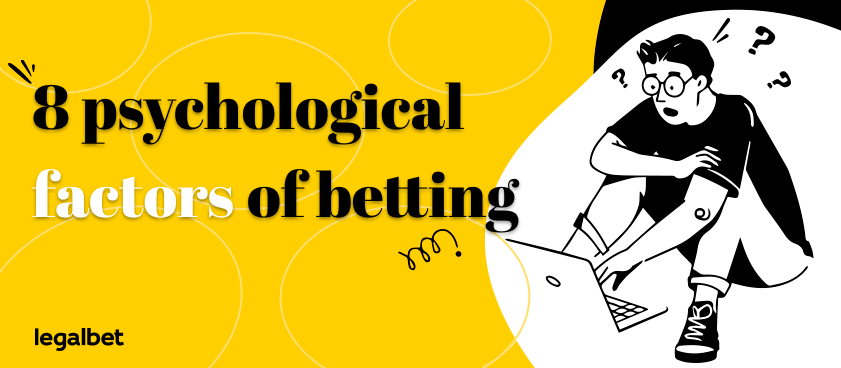8 Unexpected Psychological Factors That Are Affecting Your Bets
Sports betting is not just about statistics, numbers, calculations and finding a profitable option. The second side of betting is within ourselves.
Homo sapiens, a reasonable person, differs from a computer program in that it is prone to emotions. It can’t just be turned on and off. Psychology is the aspect that is often left out of the brackets by players. And in vain! We will talk about eight extremely unexpected factors that affect your choice of bets.

1. Hunger is your friend
Have you drank a beer, ate a couple of hamburgers and got ready to bet on the game of your favourite team? Bad idea! Research by Dutch scientists from the city of Utrecht has shown extremely interesting results: when a person is hungry, he makes strategically more correct and verified decisions. Subjects were sometimes shocked by their betting options, but they subsequently led to large wins.
It is difficult to fully understand why a hungry bettor is better than a well-fed one. Perhaps it is a matter of primitive instincts when a hungry person had to come up with something in order to get his own food. Maybe because of some physiological processes in our bodies. But the fact remains - hunger is your assistant when it comes to betting.
2. Weather is a factor
We all live in warm, comfortable houses where there are light, furniture and a heater. But human nature cannot be fooled. Our ancestors were afraid of the cold season when it would be difficult to get food, and all-around there would be more dangers. Perhaps today the feeling of fear of the winter period has weakened, but the brain is still trying to avoid great risk in the cold season.
The University of Toronto performed a study and found that if a person is far from the equator, then he tends to take less risk in the winter and more risk in the summer.
Alarmed - means armed: take control of the time of year.
3. Do not chase your losses
An interesting fact from the bestselling book "The Science of Selling: Proven Strategies to Make Your Pitch, Influence Decisions, and Close the Deal", will be appealing to amateurs who make live bets, repeating their own pre-match bet. This practice is generally referred to as “chasing your losses."
So, what is happening?
- Before making a bet the player is lost in doubt, not sure of the odds - 50/50.
- After the bet is made, the player has full confidence in their victory, through the denial of obvious facts.
The worst thing in this situation is to increase the amount of the bet in live mode when it is clear that the analysis was not entirely true or had previously not worked.
Do not chase your losses- stay calm and take a break.
4. Cognitive bias
Cognitive bias is one of the most unpleasant situations for a gambler, both experienced and novice. From the analysis of a sporting event, one factor uncovers consciousness, which gradually becomes dominant. All new incoming data can in no way affect a player’s decision on a bet. Moreover, each new information seems to only reinforce the chosen option.
Unfortunately, no matter how self-aware or disciplined we are, cognitive bias can’t ever be completely overcome. The human brain will still give specific weight to all pieces of information, and make a choice in favour of the one that has outweighed. There is only one solution - use new data as essential, completely unrelated to old information.
5. The effect of "memory leak"
Another effect from cognitive bias is the possibility of a “memory leak”. A situation where a player knows some important information, but layers of new data begin to gradually overlap it. Gradually, human memory levels the value of primordial knowledge, nullifying them.
In a world of an endless stream of new data, the effect of a "memory leak" for a player becomes very dangerous. But there is a way out. Keep your own analytical data checklist. Assign percentage weight to each information you consume, so that nothing gets lost.
6. Happy people take more risks
They say that in a bad mood, and even more so in depression, you should not make any key decisions. However, scientists have found, the same thing works in the opposite direction as well: when in a good mood, people tend to take more risky decisions without reason. There is a direct correlation between fun and increased risk.
For a bettor, the most dangerous moment is after winning the previous bet. At this moment, the sea is knee-deep, and any next game is extremely interesting to place a bet on.
Control your emotions. Neither bad nor good moods are allies in betting.
7. Recent trends
There is nothing wrong with the trends themselves: the player reveals a certain sequence that brings a gain at a distance. Sports, indeed, are cyclical and has certain trends. Often long-lasting. However, do not be hostage to trends.
Each new game should be evaluated separately. If there are “beacons” that indicate a possible distortion of the trend, they cannot be ignored. The essence of the analysis is precisely to find a trend, confirm it, and then refute it. Irrationally? But then do not bite your elbows.
Do not blindly rely on trends. If there is no confirmation in the statistics – simply move on.
8. Focus on winnings, don't be afraid to take risks
New Scientist magazine published an interesting study: people who were afraid of heights were asked to estimate the size of the building. From below, they gave one estimate, and at the top, it grew four times taller.
It’s important for players not to be afraid to lose. If you put money into the bookmaker’s account and cannot make the first bet, this is exactly the story. Fear of losing fetters us and does not allow us to think rationally, to evaluate. As a result, we put a little money on a good bet, and then we are surprised when it wins - why did this happen? Just that the building on top is four times higher than at the bottom.
Some of these factors may seem ridiculous to you, others - far-fetched and others are completely useless. Actually, this is where we started: every person is subject to emotions. Just don’t forget about it when you re-open the betting line for study.

 Atalanta
Atalanta
 Borussia Dortmund
Borussia Dortmund
 Al Najma
Al Najma
 Al-Nassr
Al-Nassr
 Al-Feiha FC
Al-Feiha FC
 NEOM
NEOM
 PSG
PSG
 Monaco
Monaco
 Juventus
Juventus
 Galatasaray
Galatasaray